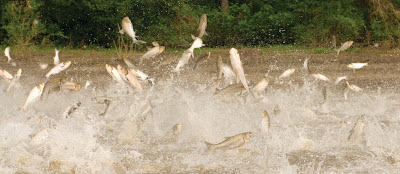 Sometimes, what can be considered a problem in one area of the world might prove to be a solution to a problem somewhere else on the globe. One such case is the use of Asian Carp as a high-protein food source for Haitian children impacted by the devastating earthquake in January of 2010.
Sometimes, what can be considered a problem in one area of the world might prove to be a solution to a problem somewhere else on the globe. One such case is the use of Asian Carp as a high-protein food source for Haitian children impacted by the devastating earthquake in January of 2010.
“Some innovative thinking is now turning the problem fish into a high-quality protein source for the children at Zanmi Beni, run by Operation Blessing International. Researchers at NOAA’s Louisiana Sea Grant program and the Louisiana State University (LSU) AgCenter have successfully produced canned Asian carp pleasing to the Haitian palate. Ultimately, the product could deliver high-quality protein to people in need, be a boon to fishermen, provide a new opportunity for canneries, and reduce the population of an unwanted invasive species.”
Louisiana Sea Grant Fisheries Specialist Julie Anderson attended IISG’s Asian Carp summit and was able to network with several people including Carol Engle of the University of Arkansas. Carol’s work had involved developing a USDA-approved process for canning Asian Carp, making it possible to safely prepare, store, and ship the food where it was needed.

